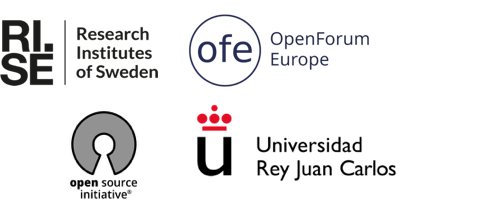We’re exploring the role of Open Source in AI
Deep Dive: AI has officially started! It’s an exciting milestone for the whole OSI team. This online event with its innovative format will keep OSI busy until the end of 2022. The podcast is live and you should subscribe now so you don’t miss any of the five episodes of this first series.
The five episodes cover issues of copyright, how independent hackers are creating powerful AI models, what’s the status of regulations of AI in Europe, what are the ethical challenges posed by uncontrolled AI software and what components are important for AI, with an eye on hardware and drivers.
The series is the starting point of a conversation to understand what happens when data becomes input to train AI models. It’s not software in the traditional sense, nor pure data. What is a pre-trained model, from the copyright perspective? What rights do developers need to run, modify, distribute, monetize AI artifacts, like inferred models? What are the implications for society, as AI systems decide who gets out of jail or gets a loan?
AI poses a lot of the same questions that the Open Source movement started answering 25 years ago, when the internet was starting. As new licenses started to appear for different pieces of the AI system, the OSI is helping the community find clarity for developers and lawyers to reduce confusion and improve collaboration.
Apple Podcasts | Google Podcasts | PocketCasts | Spotify | RSS
Discuss this and other topics during OSI’s informal office hours on Fridays.
Stefano Maffulli
Executive Director, OSI
In this month’s Open Source Initiative newsletter:
- Tackling sticky questions about cryptocurrency and Open Source from a legal perspective
- What is an Open Source Program Office and why you should have one
- Reflection on SCaLE19x conference
- The five stages of the Open Source Program Office
- Notable open source news
- New sponsors announcements
Tackling sticky questions about cryptocurrency and Open Source from a legal perspective
In the days following the Free Software Foundation Europe Legal Network Conference in Stockholm, an email discussion ensued that brought up challenging questions around cryptocurrency and blockchain distributed ledger technology and Open Source software. Andrew Wilson, retired Open Source strategist, brought together a group of experts (Georg Greve, James Bottomley, Luis Villa, Miriam Ballhausen and Robbie Morrison) who have varied perspectives on the issues for a public panel discussion. We’ve prepared a summary of the topics explored by the panelists.
CFP IEEE Software – Open Source Software in the Public Sector

Guest Editors Johan Linåker; Sachiko Muto, Gregorio Robles, and Deborah Bryant welcome submissions for the upcoming themed edition of IEEE Software on Open Source Software in the Public Sector. In-depth case studies, experience reports, and analytical contributions, aiming to shed light on this multifaceted topic, of how public sector organizations can adopt, develop, and collaborate on OSS are sought.
Submissions Due: 1 December 2022 – Publication July/August 2023
Please see the IEEE CFP page for details.
Reviewers: If you are interested in volunteering as a reviewer, we are looking for individuals with credentials in this domain – academic, earlier industry and public sector practitioners. Please email your interest and qualifications to deb.bryant@opensource.org.
What is an Open Source Program Office and why you should have one
The rise of the Open Source Program Office (OSPO) roughly mirrors the proliferation of Open Source software to build and run the most important technology applications within organizations in the world today. A well-designed OSPO is the center of competency for an organization’s Open Source operations and structure. Its role can include setting code use, distribution, selection, auditing, and other policies, as well as training developers, ensuring legal compliance, and promoting and building community engagement that benefits the organization strategically.
Written by Chris Aniszczyk and Ana Jiménez Santamaría, this article is contributed by TODO Group, an OSI Affiliate organization
The five stages of the Open Source Program Office
After years of observing the evolution of Open Source Program Offices (OSPOs) among members of the TODO Group, they’ve identified common patterns and summarized them in a shared framework. There are five common stages of the OSPOs that identify the status of your organization’s involvement in Open Source: use it as suggestions to advance your Open Source journey. This article is a companion to What is an OSPO and why you need one.
Written by Chris Aniszczyk and Ana Jiménez Santamaría, this article is contributed by TODO Group, an OSI Affiliate organization
Reflection on SCaLE19x conference
We recently attended the SCaLE 19X conference in Los Angeles and it was a great time. Three of our board members were speakers at this year’s conference. Aeva Black’s keynote presentation was on Saturday, July 29th. They discussed what Open Source maintainers can begin doing to prepare for federal SBoM (software bill of materials) requirements under discussion in Congress today. New OSI board member’s Josh Berkus and Amanda Brock also spoke at this year’s event.
OSI in the news
In case you missed it, the OSI was featured in this article:
- 11 Projects You Can Donate to for a Better Internet. To play your part in protecting this great resource, you can donate to these 11 nonprofit organizations that are working for a better, secure internet.
And a huge shoutout to all of our new and renewing sponsors
- DataStax – new Innovator Sponsor
- FerretDB – new Maintainer Sponsor
- Word Unscrambler – renewing Community Sponsor
- Devrella – renewing Community Sponsor
- Miro-Kredit AG – renewing Community Sponsor
Are you interested in sponsoring or partnering with the OSI? Please see our Sponsorship Prospectus. Contact us to find out more about how your organization can promote open source development, communities and software.


Likes
Reposts